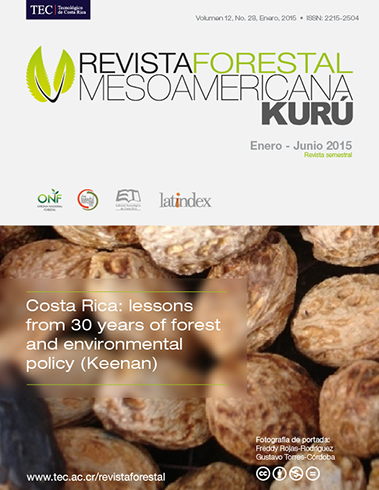Internal bond strength of particle boards manufactured from a mixture of Gmelina arborea, Tectona grandis and Cupressus lusitanica with the fruit of Elaeis guineensis, leaves of Ananas comosus and tetra pak packages
Main Article Content
Abstract
Some countries with tropical climate produce a great variety of lignocellulosic waste from crops planted in small areas and also, urban areas produce a great amount of wastes fromTetra Paks packages without any kind of management. A possible solution is to incorporate these wastes into particleboards. The main objective of this work is to determine the relation in a mixture of particles from the empty fruit bunch of Elaeis guineensis (EFB), pineapple leaves (Ananas comosus) (PL), and Tetra Pak packages (TP) with 3 kinds of wood from forest plantations (Gmelina arborea, Tectona grandis and Cupressus lusitanica) commonly used for particleboards manufacturing. The proportions 50:50, 70:30, and 90:10 (waste:wood) with adhesive at 6, 8, and 10% (weight/ weight) were tested for resistance regarding internal bond strength (IB). The results showed that the IB values varied from 100 to 275 kPa in matrixes with PL, from 100 to 360 kPa for EFB and from 200-600 kPa in matrixes with TP. Furthermore, it was found that when the EFB and PL proportion decreases, the IB values increased, where mixture 90:10 with 10% adhesive showed the highest IB values. But for matrixes with TP, IB value is higher in proportions where the presence of wastes is greater, the 50:50 proportion with 10% adhesive showed the highest strength.
Article Details
How to Cite
Moya-Roque, R., Camacho-Cornejo, D., Soto-Fallas, R., & Mata-Segreda, J. (2014). Internal bond strength of particle boards manufactured from a mixture of Gmelina arborea, Tectona grandis and Cupressus lusitanica with the fruit of Elaeis guineensis, leaves of Ananas comosus and tetra pak packages. Revista Forestal Mesoamericana Kurú, 12(28), 36–45. https://doi.org/10.18845/rfmk.v12i28.2098
Section
Artículos
Al enviar un artículo a la Revista Forestal Mesoamericana kurú (RFMK), los autores ceden los derechos patrimoniales a la editorial de la RFMK una vez su manuscrito haya sido aprobado para publicación, autorizando a la RFMK a editarlo, reproducirlo, distribuirlo, y publicarlo en formato físico y/o electrónico, incluido Internet. La titularidad de los derechos morales sobre los trabajos objeto de esta cesión seguirá perteneciendo a los autores.
Este obra está bajo una Licencia Creative Commons Atribución-NoComercial-SinDerivadas 4.0 Unported.


